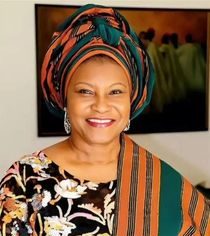Born on June 2, 1954 in Kano State, Ireti Heebah Kingibe grew up in a home that blended cultures and faiths—her father a Yoruba-Fulani Muslim and her mother an Igbo-Bonny Christian senatoriretikingibe.com Wikipedia. She began her schooling at Emotan Preparatory School before moving on to Queen’s College, Lagos and Washington Irving High School in New York. Driven by a love of problem-solving, she earned a degree in Civil Engineering from the University of Minnesota between 1975 and 1980 Nairaland Wikipedia.
Building a Foundation in Engineering
After graduation, Kingibe honed her technical skills in the United States, working first as a quality control engineer with Bradley Precast Concrete Inc. and then as part of the Minnesota Department of Transportation Design Unit from 1979 to 1991. When she returned to Nigeria in 1981 for her National Youth Service, she supervised a water-project at the Nigerian Air Force Base in Ikeja. Over the next decade, she held planning and consultancy roles with New Nigeria Construction Company in Kaduna and Lodigiani Nigeria Limited in Lagos, before becoming a senior partner at Kelnic Associates in Abuja BioLegacy Foundation Wikipedia.
Entering the Political Arena
Kingibe’s formal political journey began in 1990, when she was appointed Adviser to the National Chairman of the newly created Social Democratic Party (SDP). That role introduced her to the inner workings of party politics just as Nigeria edged toward a brief experiment in democracy Nairametrics Wikipedia. During the military interregnum of the 1990s she remained active behind the scenes, returning fully to politics with the All Nigeria Peoples Party (ANPP) in 1998.
Navigating Multiple Party Platforms
In 2003, Kingibe stood as the ANPP senatorial candidate for the Federal Capital Territory but did not win. She joined the Peoples Democratic Party (PDP) in 2006, seeking a platform with broader national reach. By 2014, disillusioned by internal PDP disputes, she decamped to the All Progressives Congress (APC) and even sought its FCT senatorial ticket in 2015 before withdrawing in favor of party unity The Abuja Inquirer Wikipedia.
A Landmark Win with the Labour Party
In 2022, drawn by the Labour Party’s momentum, Kingibe became its FCT senatorial candidate. On February 25, 2023, she stunned observers by unseating three-term incumbent Philip Aduda—winning with over double his votes and becoming the first woman in 20 years to represent the Federal Capital Territory in the Senate Nairametrics The Abuja Inquirer. Ahead of the election, she pledged to donate her basic Senate salary toward improving rural infrastructure in Abuja—a promise that underscored her commitment to service over self Wikipedia.
Leadership in the 10th Senate
Shortly after being sworn in on June 13, 2023, Kingibe was named Chairman of the Senate Committee on Women Affairs—tasked with driving legislation that advances gender equality, protects women’s rights, and expands economic opportunities for Nigeria’s female citizens. In this role, she has already held public hearings on maternal health, championed bills for women’s vocational training, and secured funding for local empowerment programs African Leadership Magazine.
Focus Areas and Achievements
- Gender Parity Legislation: Sponsoring a bill to mandate 35% female candidacy quotas across major political parties.
- Infrastructure Advocacy: Pressing for improved water supply, roads, and broadband access in Abuja’s rural districts.
- Youth and Women Empowerment: Launching skills-training grants and regular town-hall meetings to collect community feedback.
Her engineering background gives her a data-driven approach to oversight—she frequently publishes committee reports and opens her office to constituent visits, ensuring transparency and accountability Wikipedia.
Inspiring the 35% Project
Ireti Kingibe’s journey—from technical expert to political trailblazer—shows how diverse experience strengthens leadership. As The 35% Project works toward meaningful gender balance in Nigeria’s political institutions, her story offers both a blueprint and a beacon: with persistence, principled service, and a focus on real-world results, women can reshape governance and secure their rightful place at every level of decision-making.
